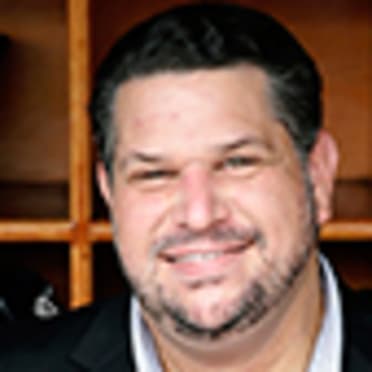
The interview with Stan Kasten for this story and podcast took place early in Spring Training, weeks before camps were closed due to the coronavirus pandemic.
Stan Kasten has authored one of the most extraordinary careers of any sports executive in history, though if it had been up to him, he may have done things a little differently.
Of course, when you work for Ted Turner, that isn’t necessarily an option.
On the Season 4 premiere of Executive Access, Kasten sat down to discuss a legendary career that has taken him through Atlanta, Washington and Los Angeles for more than four decades.
Following his graduation from Columbia University Law School, Kasten took the bar exams in both New York and New Jersey, then embarked on a trip around the country to visit Major League ballparks before he began his career as an antitrust lawyer.
One of his final stops was St. Louis’ Busch Stadium, where Kasten spotted a familiar face running up and down the stands during the Cardinals’ game against the Braves.
“I was as big a fan that I knew the owners of teams,” Kasten said. “I don’t know how, because it was Ted Turner’s first year owning the team, but I knew who that was.”
The two struck up a conversation, and before long, Turner invited Kasten to visit him in Atlanta.
“That was 1976, and I have been there ever since,” Kasten said.
Kasten was hired to be general counsel for the Braves, though a few months after he started, Turner purchased the NBA’s Atlanta Hawks. Turner appointed Kasten as the Hawks’ assistant general manager, later promoting him to GM in 1979.
At the age of 27, Kasten was the youngest GM in NBA history, though he knew he wasn’t prepared for such a job.
“I tried to hide it well, and I had just enough self-confidence and arrogance that I think I pulled it off,” Kasten said. “I had no natural constituency; I was not a former player, I had not been in the league, I didn’t know any of the people. I really had to start from scratch.
“Within a couple years, things fell into place.”
In 1986, Kasten was promoted again, this time to team president. He was still handling GM duties, as well, but Turner wanted Kasten to take on another title, too: president of the Braves.
“I had been having some success; the Braves were beyond woeful and had a long history of being beyond woeful,” Kasten said. “Ted says to me, ‘I need you to come run the Braves.’ He knew my first love was baseball; that’s why I came to Atlanta.
“But I had been establishing myself; I had been building a career in the NBA. I said no. He didn’t want me to just do it instead of the Hawks; he wanted me to do it in addition to the Hawks. I said, ‘No, Ted, that’s not right. It can’t be done.’ He said, ‘Oh, come on, you can definitely do it. You’ll be the first one running two teams, isn’t that right?’ I said, ‘Yeah, Ted. Do you know why that is? It’s such a bad idea.’
“But Ted and I had this understanding; when he and I disagreed on something, we just did things his way. That’s how I became the president of the Braves.”
Turner had been a hands-on owner during his first decade with the Braves, but Kasten insisted that he be given the opportunity to lay out his own plan for rebuilding the franchise.
“I took 30 days to go in and see what I could find, and I had some clear understandings right away,” Kasten said. “And I went back to him 30 days later [and] I said, ‘Ted, here's the problem: Every year, your ad boys at the TV station need you to get that year's top free agent, whether it’s Claudell Washington or Al Hrabosky or Andy Messersmith. You're not taking yourself closer to winning; you’re taking yourself farther away because you're wasting money invariably.'
“'If you spend a lot of money, and if you're lucky, you get one great season out of one great player instead of taking that same money and buying more Minor League teams, hiring more scouts, hiring more instructors, getting more kids. Maybe you'll develop with that same amount of money 10 players who will give you 10 seasons each. That's a much different return. And you're not giving up Draft picks. You're not blocking the way for other young kids.'
“And I go through all this and he looks at me and says, ‘Stan, I don't need a lecture. Just go do it.’ When Ted said, ‘Stan, just go do it,’ he meant it. A lot of owners will tell you that; they'll tell you put a long-term plan in place and they'll tell you to do things the right way. But as soon as you lose two games in a row, people start getting fired. We've seen that repeatedly. Ted meant it.”
Kasten warned Turner that he might be viewed as “the village idiot” on the local talk shows -- “We didn't have the internet yet or Twitter, thank goodness” -- but Turner didn’t care what anybody else thought as long as the end result was a successful team.
“Ted was too busy to think about the Braves full-time, with other bigger, global things, so he let me do the thing,” Kasten said. “Bobby Cox was already there, devoted to player development. I came in with Ted's blessing to turn the dial all the way to the right and really put a development plan in place.
“The final piece was me finding the right GM to do the mix to get Bobby back into the dugout. I hired John Schuerholz and everything fell into place after that.”
It sure did. Under Kasten’s watch, the Braves won 14 consecutive division titles, five National League pennants and the 1995 World Series.
Listen to the entire interview on the Season 4 premiere of Executive Access, available on Apple Podcasts, Spotify, Google Play, Art 19 or wherever you get your podcasts.
